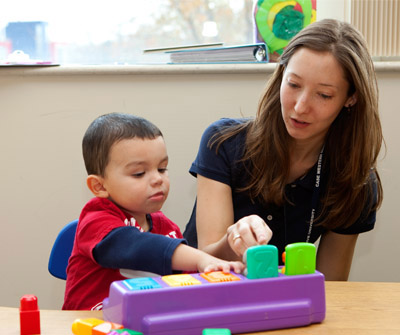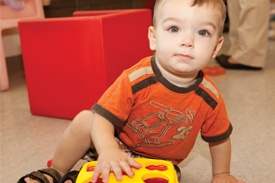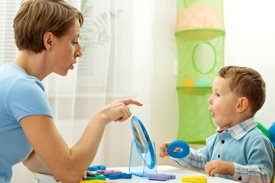Playing with your child is a essential way to improve his/her speech, language, and social skills! Below are five different toys and ways to play with your child to encourage language growth and development:
Mr./Mrs. Potato Head:
- Following Directions: Ask your child to give you various parts. If this is too simple, ask him/her in a more complex way. For example, instead of asking for Mr./Mrs. Potato Head's shoes, say "the ones you put on your feet.” Sometimes this works best after the child has built Mr./Mrs. Potato Head and is asked to follow the directions of placing each part back into the box.
Read More
Tags:
Speech,
Language,
Communication,
Support,
Learning,
Voice,
toddler,
talking
Did you know…
- An estimated 40 million Americans experience speech, language, and/or hearing disorders.
- The second most common reason for special education services in public schools is speech/language impairment.
- 36 million American adults report so
Read More
Tags:
Speech,
Hearing Aid,
Audiology,
Language,
Hearing Aids,
Communication,
Hearing,
reading,
literacy,
Hearing Loss Prevention,
Teens,
Support,
Caregiving,
Hearing Loss,
Stuttering,
Learning,
Voice,
toddler,
talking,
Autism
Teaching your infant Baby Sign Language can help improve his or her communication skills. This is particularly appealing for new parents, given that there’s a gap between what babies and toddlers want to say and what they can verbally express.
Read More
Tags:
Speech,
Language,
Communication,
American Sign Language,
ASL,
Learning,
Voice,
toddler,
talking
Children who have been identified with speech-language impairments have likely established nonstandard patterns of speaking or have deficits that will require extra attention and training to improve. The speech-language pathologist (SLP) working with you and your child should serve as a "coach" to provide you with activities or homework to reinforce newly established skills and to strengthen emerging skills. One or two sessions a week is not enough, and your involvement in carryover activities is crucial to your child's communication development. Talk with your SLP about activities and games you can use at home to help.
Read More
Tags:
Speech,
reading,
literacy,
Teens,
Support,
Learning,
Voice,
toddler,
talking
Learning the rules of English will not erase your accent but will make it easier for others to understand you. Your identity will not, and cannot, be diminished. However, accent modification training can, and will, expand your abilities and allow you to communicate optimally.
Read More
Tags:
Speech,
Language,
Communication,
Learning,
talking,
Accent Modification
Experts recommend you read to your child as often as you can and that you strive to have at least one scheduled reading time each day. Choosing regular times to read (especially before naps and bedtime) is a way to help your child learn to sit with a book and relax. But you can read anytime your child seems in the mood.
If your toddler will let you, hold him or her in your lap when you read. It's a great spot for:
Read More
Tags:
Speech,
Language,
Communication,
literacy,
Learning,
Voice,
toddler,
talking
Children begin developing speech as an infant. By 6 months, babies coo and play with their voices by producing sounds such as "oo," "uh," "mm," "da," and "goo." Children learn speech by imitating the sounds they hear. Actions such talking about what you are doing during the day, singing songs and reading books expose your child to a variety of sounds that he or she will begin imitating.
Read More
Tags:
Speech,
Language,
Communication,
Voice,
talking
It’s common for most children to make some mistakes as they learn to say new words. Different sounds are mastered at different ages. Consistent, correct sound production will vary from child to child. When mistakes continue past a certain age, that’s when it's considered a speech sound disorder. Speech sound disorders include problems with articulation (pronouncing sounds correctly) and phonological processes (errors with sound patterns).
Read More
Tags:
Speech,
Language,
Communication,
Voice,
toddler,
talking
Children learn to talk by listening to those around them. The first few years of life are a critical time for speech and language development. Children must be able to hear speech clearly in order to learn language. Fluctuating hearing loss due to repeated ear infections might mean the child doesn't hear consistently and may be missing out on critical speech information. Permanent hearing loss will also affect speech and language development, especially if it is not detected early. The earlier hearing loss is identified and treated, the more likely the child will develop speech and language skills on par with children who aren’t experiencing hearing issues.
Read More
Tags:
Speech,
Hearing Aid,
Hearing Aids,
Communication,
Hearing,
Deaf,
Hard of Hearing,
Hearing Loss,
Learning,
Voice,
toddler,
talking



















